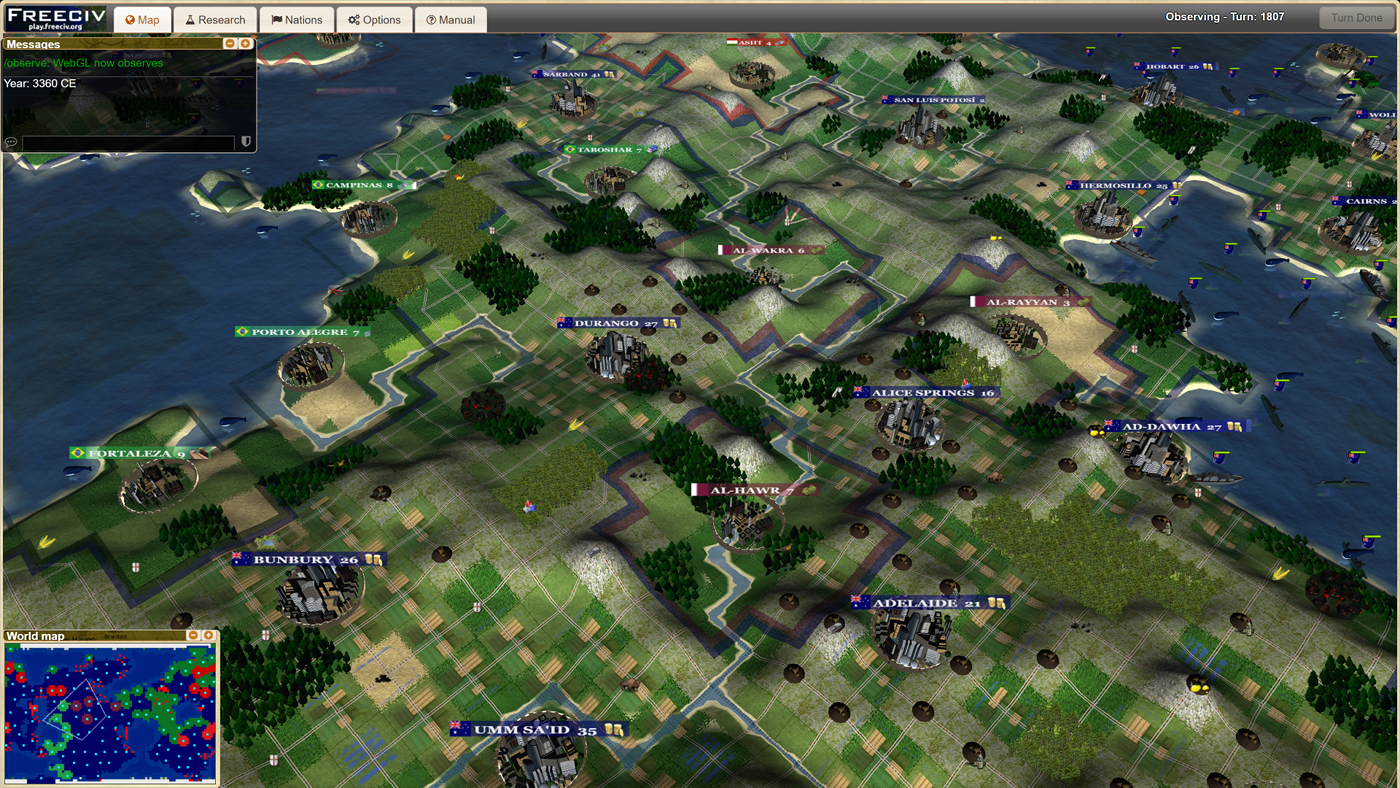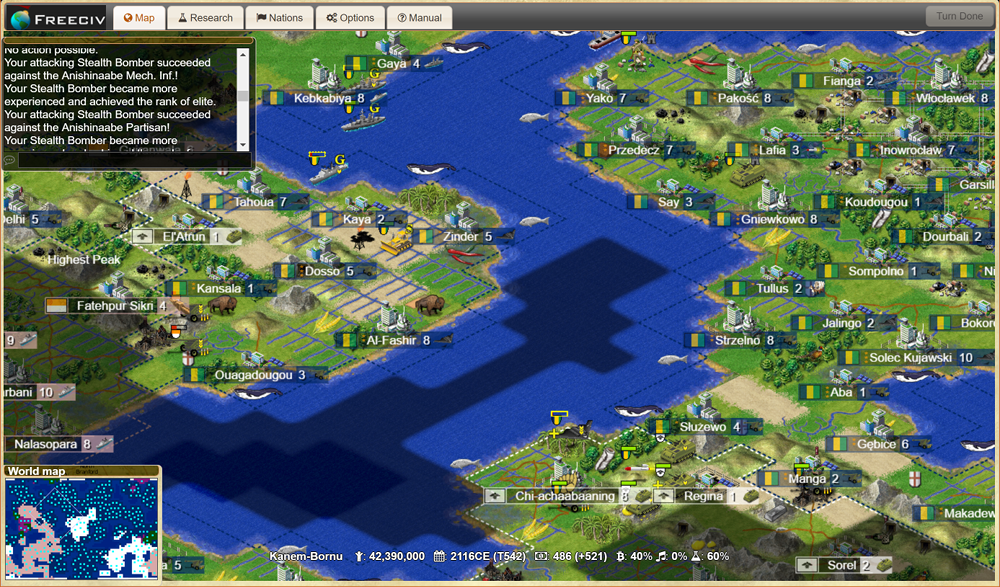Freeciv-web is an open-source turn-based strategy game. It can be played in any HTML5 capable web-browser and features in-depth game-play and a wide variety of game modes and options. Your goal is to build cities, collect resources, organize your government, and build an army, with the ultimate goal of creating the best civilization. You can play online against other players (multiplayer) or play by yourself against the computer. There is both a HTML5 2D version with isometric graphics and a 3D WebGL version of Freeciv-web.
Freeciv-web is free and open source software. The Freeciv C server is released under the GNU General Public License, while the Freeciv-web client is released under the GNU Affero General Public License. See License for the full license document.
Freeciv-web is now playable online at http://play.freeciv.org/
More info about the WebGL 3D version can be found for developers and 3D artists.
Freeciv-Web consists of these components:
-
Freeciv-web - a Java web application for the Freeciv-web client. This application is a Java web application which make up the application viewed in each user's web browser. The Metaserver is also a part of this module. Implemented in Javascript, Java, JSP, HTML and CSS. Built with maven and runs on Tomcat 8 and nginx.
-
Freeciv - the Freeciv C server, which is checked out from the official svn repository, and patched to work with a WebSocket/JSON protocol. Implemented in C.
-
Freeciv-proxy - a WebSocket proxy which allows WebSocket clients in Freeciv-web to send socket requests to Freeciv servers. WebSocket requests are sent from Javascript in Freeciv-web to nginx, which then proxies the WebSocket messages to freeciv-proxy, which finally sends Freeciv socket requests to the Freeciv servers. Implemented in Python.
-
Publite2 - a process launcher for Freeciv C servers, which manages multiple Freeciv server processes and checks capacity through the Metaserver. Implemented in Python.
-
pbem is play-by-email support.
-
freeciv-earth is code to generate Freeciv savegames from a map captured from mapbox.
Freeciv-web can be setup using Vagrant on VirtualBox to quickly create a local developer image running Freeciv-web on Ubuntu 16.04 on your host operating system such as Windows, OSX or Linux. This is the recommended way to build Freeciv-web on your computer.
- Install VirtualBox: https://www.virtualbox.org/ - Install manually on Windows, and with the following command on Linux:
sudo apt-get install virtualbox- Install Vagrant: http://www.vagrantup.com/ - Install manually on Windows , and with the following command on Linux:
sudo apt-get install vagrant- Install Git: http://git-scm.com/ then check out Freeciv-web from git to a directory on your computer, by running this git command:
git clone https://github.com/freeciv/freeciv-web.git --depth=10- Run Vagrant with the following commands in your Freeciv-web directory from step 3:
vagrant upThis will build, compile, install and run Freeciv-web on the virtual server image. Wait for the installation process to complete, watching for any error messages in the logs.
- (Skip this step if you run Windows) For Linux or OS X, then you need to setup a SSH tunnel to port 80 like this:
sudo ssh -p 2222 -gNfL 80:localhost:80 vagrant@localhost -i ~/.vagrant.d/insecure_private_keyThen test Freeciv-web by pointing your browser to http://localhost/ on your host operating system.
To log in to your Vagrant server, run the command:
vagrant sshThe Vagrant guest machine will mount the Freeciv-web source repository in the /vagrant directory. Note that running Freeciv-web using Vagrant requires about 4Gb of memory and 3 Gb of harddisk space.
Install this software if you are not running Freeciv-web with Vagrant:
-
Tomcat 8 - https://tomcat.apache.org/
-
Java 8 JDK - http://www.oracle.com/technetwork/java/javase/downloads/
-
Python 3.6 - http://www.python.org/
-
Pillow v2.3.0 (PIL fork) - http://pillow.readthedocs.org/ (required for freeciv-img-extract)
-
Mysql 5.5.x - http://www.mysql.com/
-
Maven 3 - http://maven.apache.org/download.html
-
Firebug for debugging - http://getfirebug.com/
-
curl-7.19.7 - http://curl.haxx.se/
-
OpenSSL - http://www.openssl.org/
-
nginx 1.11.x or later - http://nginx.org/
-
MySQL Connector/Python - https://github.com/mysql/mysql-connector-python
-
pngcrush, required for freeciv-img-extract. http://pmt.sourceforge.net/pngcrush/
-
Tornado 4.4 or later - http://www.tornadoweb.org/
-
Jansson 2.6 - http://www.digip.org/jansson/
-
liblzma-dev - http://tukaani.org/xz/ - for XZ compressed savegames.
Start and stop Freeciv-web with the following commands:
start-freeciv-web.sh
stop-freeciv-web.sh
status-freeciv-web.sh
All software components in Freeciv-web will log to the /logs sub-directory of the Freeciv-web installation.
Freeciv-Web is built on Travis CI on every commit. This is the current build status:
Freeciv-web has CasperJS tests which are run by Travis CI on every commit, and by Vagrant when creating a new image. The tests can be found in tests/freeciv-web-tests.js. Please make sure that patches and commits for Freeciv-web don't break the CasperJS tests. Thanks!
If you want to contibute to Freeciv-web, see the issues on GibHub and the TODO file for some tasks you can work on. Pull requests on Github is welcome!
Andreas Røsdal @andreasrosdal
Marko Lindqvist @cazfi
Sveinung Kvilhaugsvik @kvilhaugsvik
Gerik Bonaert @adaxi
Lmoureaux @lmoureaux
and the Freeciv.org project!


